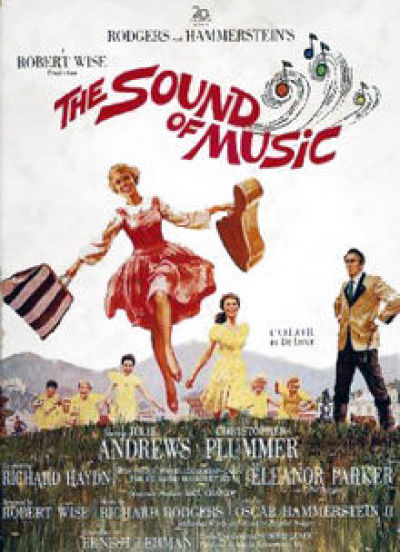'Sound of Music' as Christian Allegory

"Sound of Music" the film with Julie Andrews and Christopher Plummer is celebrating its 50th anniversary, and Diane Sawyers hosted an affecting ABC remembrance of it last evening, interviewing both lead actors. The story of a pious but spiritually restless nun/nanny who falls in love and marries the war hero widower father of her young charges amid the Nazi takeover of Austria has been universalized in global popular culture. Even children in nightmarish North Korea sing songs from the musical, Sawyer incredulously reported.
Critics, as the Sawyer program noted, have dismissed the tale as a "sugar coated fantasy," an escapist and feel-good love story set amid the glories of the Austrian Alps, in charming Salzburg, full of songs children can sing, with a dash of slapstick Nazi danger and nun comedy lathered in. Certainly it's not a serious drama, supposedly.

But "Sound of Music," based loosely on the real-life von Trapp family, who did indeed escape their native Austria after its merger with the Third Reich, contains several quite serious themes that together make it a Christian allegory about vocation, family, marriage, citizenship, patriotism and the moral response to evil.
First there is Julie Andrews/Sister Maria's spiritual struggle over her calling as a nun, amid her swelling devotion to the von Trap children and their father, about which she consults her stern but affectionate mother superior. Second, there is Christopher Plummer's/Captain von Trap's struggle to father his brood of children after their mother's death, compounded by his plans to marry a wealthy countess who would ship the children off to boarding school.
Third, there is the triumphant cathedral wedding of Maria and the Captain, over which the bishop of Salzburg presides, attended by all the nuns of her former convent, the children and townspeople. Fourth, there is conflict over Austrian loyalty after the Nazi ascendancy, with the Captain refusing to collaborate, while his far less principled friend and counselor urges compromise. Fifth, there is the Captain's fierce loyalty to Austria, as an aristocrat and former naval officer of the old empire, a love in which the masses of townspeople join by singing an Austrian anthem as the Nazis uncomfortably watch.
Sixth, there is the quandary of how the Captain should respond to a summons from Berlin to serve in Hitler's navy, and to what extent others should assist the von Trapp family escape from Austria, including the nuns, at their own peril. The Captain, who is stubborn and priggish, is also courageous and morally consistent, despising and refusing to acknowledge the new Nazi overlords. In one scene, he rips to sunder a Nazi flag that had festooned his home to protect the family from suspicions of subversive sentiment. The Captain not only will risk suspicion, he invites it, despite all he has to lose.
At his wedding to Maria, the Captain wears his old WWI naval uniform, in which he served the old Hapsburg regime, which like the von Trapps was thoroughly Catholic and alien to the impending totalitarian tyranny that the Captain defies. "Nothing has changed," notoriously insists one Nazi Gauleiter who surveills the von Traps. "Austria is the same."
Of course, Nazified Austria is not the same at all. The story is especially poignant when considering that after the von Trapp family escape, Austria in many ways more viciously embraced Hitlerism than did Germany. Austrians eagerly joined the party, served in the Third Reich's armed forces, and were complicit in some of its worst genocidal crimes.
The fictional story concludes with the von Trapps scaling the Alps for refuge in neighboring Switzerland. In real life, they came to America, settling permanently in Vermont, and becoming a singing family sensation while operating a bucolic ski resort. They never again resided in Austria, having become Americans.
"Sound of Music" dramatizes the temporal and spiritual attachments to which Christians are called, as embodied by the von Trapp's uncompromising Catholic faith. Love of family, love within marriage, love of church, love of country, love of countrymen, and supremely love of God. All these loves command resistance to corrupting evil, embodied by Austria's accession into the Nazi orbit under an ideology demanding subordination or eradication of all loves under its own monstrous control.
Love of God and His justice compels the von Trapps to abandon the land they love forever ultimately for a new home in, to them, the strange land of distant Protestant America. The real von Trapps later recounted they liked their new Vermont home because it was filled with mountains and church steeples, similar to their old home. But their permanent exile from Austria symbolized that all Christians ultimately belong to a higher and more permanent kingdom, where there is never sunset because the Light is the radiance of God.




























